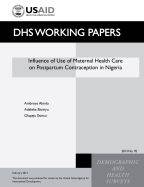- PUBLICATIONS
- JOURNAL ARTICLES
- ORDER PUBLICATIONS
Publications Summary
- Document Type
- Working Papers
- Publication Topic(s)
- Maternal Health
- Country(s)
- Nigeria
- Language
- English
- Recommended Citation
- Akinlo, Ambrose, Adeleke Bisiriyu, and Olapeju Esimai. 2013. Influence of Use of Maternal Health Care on Postpartum Contraception in Nigeria. DHS Working Papers No. 92. Calverton, Maryland, USA: ICF International.
- Download Citation
- RIS format / Text format / Endnote format
- Publication Date
- February 2013
- Publication ID
- WP92
Download
 Influence of Use of Maternal Health Care on Postpartum Contraception in Nigeria (PDF, 408K)
Influence of Use of Maternal Health Care on Postpartum Contraception in Nigeria (PDF, 408K)
Download this publication
There is no printed copy available to order.
